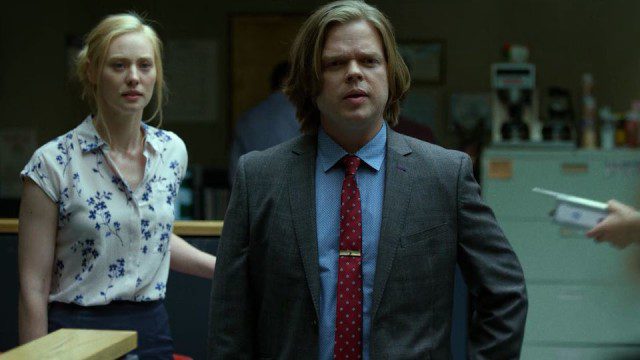When your season premiere ends with your main character getting shot in the head, it becomes a hard act to follow. “Dogs To a Gunfight” fails, at times, to retain the momentum of “Bang.” It drags in spots, and serves as more of an extended introduction to the Punisher. The latter part of that is fine, because the Punisher is awesome, and Jon Bernthal is absolutely destroying this role (even after two episodes I’m confident in that assessment). But for all its noir trappings, Marvel’s Daredevil works best with a little more zip and zeal.
For example: the back and forth with the DA’s office about Grotto. It’s nice to see Foggy go toe to toe with the DA and emerge victorious, but he undercuts his moment of triumph once again by explaining it away, just like he did with the biker in “Bang.” Stop being so modest, dude! Did you see how Karen was looking at you? This could be an endearing character quirk, but Foggy doesn’t need any more quirks. The guy’s name is “Foggy,” for Christ’s sake: he is a quirk. Let him have his moments of triumph, Daredevil, especially in this season.
The reason I say that is because this season looks as if it wants to put the entire concept of vigilantism on trial. The Punisher is presented as the philosophical opposite of Daredevil, and even Sgt. Mahoney says of him, he “makes everybody think twice about the whole ‘hero’ proposition.” That’s a smart, cerebral approach to a show that is about a blind man beating up everyone in the world.
So: let’s talk the Punisher. The Punisher is one of my favorite superheroes ever, probably because he’s A, not a hero, and B, has no powers, unless you count “fuck you” as a superpower, which I absolutely do. The Punisher is the perfect character through which to explore the effect that Daredevil has had on Hell’s Kitchen; Sgt. Mahoney points out that he’s not the first copycat, just the latest one. Karen is saddled with the obligatory lament “Maybe we created him. All of us.” That’s a line we’ve seen before, most notably in The Dark Knight, but the follow-up line is much better: “He could be any one of us.”
The meaning here is twofold: on the surface, Karen is saying that they don’t know who the Punisher is. That’s true. But what she’s also saying is that under the right circumstances, anyone could become the Punisher and start systematically wiping out every crime syndicate in Hell’s Kitchen. The darkest part about this? It works. The DA even tells Grotto that there are now “plenty of lowlifes who want to get out of crime.”
And that’s where Daredevil‘s second season is, so far, the most successful. The show has done an admirable job of setting up the Punisher as a villain, but also making it easy to identify with his mission (parts of it, at least). Look no further than the scene in the pawn shop. Once again he enters wreathed in shadow, like a walking nightmare. He’s scary, and that’s because Bernthal moves like he’s playing the killer in a slasher flick. And before we can start to ponder the implications of him buying an NYPD communcations rig (“One that picks up encryped tactical feeds”), the pawn shop owner makes the mistake of trying to sell the Punisher some child porn, and he, well, gets punished (the whole scene is slightly reminiscent of “Dirty Laundry,” a Punisher short that Thomas Jane made a few years back).
And that’s why, even in a slightly draggy episode, Daredevil remains essential television. A scene like the one described above doesn’t ask “Can you root for the Punisher?” It asks, “Can you really root for anyone?”
A Few Thoughts
- I choose to believe that the phrase “war zone” was thrown around so often as a reference to Punisher: War Zone, Lexi Alexander’s wonderfully batshit 2008 film starring Ray Stevenson. Here’s a great episode of How Did This Get Made? with Alexander and Patton Oswalt discussing the film
- “Yes, we very much appreciate the kimchi”
- In case you’re playing a drinking game to this review: Punisher

